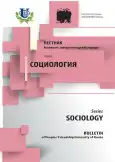Проблемы государства в учении евразийцев
- Авторы: Лебедев С.Н.1, Замараева Е.И.2
-
Учреждения:
- Литературный институт имени А.М. Горького
- Финансовый университет при Правительстве РФ
- Выпуск: Том 16, № 2 (2016)
- Страницы: 426-437
- Раздел: Социологический лекторий
- URL: https://journal-vniispk.ru/2313-2272/article/view/340566
- ID: 340566
Цитировать
Аннотация
Статья посвящена проблемам государства в учении евразийцев, одного из наиболее оригинальных и значимых течений русской общесоциологической и политико-философской мысли Русского Зарубежья в 1920-1930-е годы. Проблемы государства, поставленные евразийцами, актуально звучат в нынешнюю эпоху строительства новой российской государственности и в определенной степени обрели свое воплощение в современной политической практике. Согласно классическому евразийскому учению, все народы «России-Евразии» объединены общим «месторазвитием» и представляют собой единый исторический и социокультурный мир, органически соединивший элементы Востока и Запада. В евразийском учении о государстве провозглашается идея сильной власти и могучего государства, которое представляет интересы народа и сохраняет с ним непосредственную связь, сочетая в себе право, справедливость и закон с нормами нравственности, блага и совести. В статье анализируется ключевой евразийский концепт - «идеократическое государство», а также сущностные характеристики евразийской концепции государственного устройства, такие, как идеократия, автаркия, идея-правительница, правящий отбор. Структурирующим концептом государства является «общеевразийский национализм», который трактуется евразийцами как архетип идеологии, основа национальной идеи. Анализируются основные принципы социально-экономического устройства евразийского государства, в том числе активное участие государства в хозяйственной жизни страны, сосуществование государственной и частной форм собственности. Согласно евразийской концепции, плановое хозяйство и государственная регулировка культуры - это основы автаркического государства, которые защищают страну от экономической и гуманитарной интервенции. Делается вывод, что евразийская концепция государства может быть использована для обогащения современной научной теории, а также для решения задач модернизации российского общества на современном этапе его развития, так как она учитывает специфические национальные, геополитические, исторические и культурные особенности нашего государства и позволяет сохранить самобытность и многообразие евразийского мира.
Об авторах
Сергей Николаевич Лебедев
Литературный институт имени А.М. Горького
Автор, ответственный за переписку.
Email: statia_54@mail.ru
Кафедра общественных наук
Елена Ивановна Замараева
Финансовый университет при Правительстве РФ
Email: zamaraeva_e@mail.ru
Кафедра философии
Список литературы
- Alekseev N.N. Sobstvennost’ i sotzializm. Opyt obosnovaniya sozial’no-ekonomihceskoy pro-grammy eurazijstva [Property and socialism. Rationale for the social and economic program of Eurasianism ] // Russkiy narod i gosudarstvo. M.: Agraf, 1998.
- Eurazijstvo: Deklaraziya, formulirovka, tezisy [Eurasianism: Declaration, Wording, Theses]. Prague, 1932.
- Eurazijstvo. Opit sistematicheskogo izlozenija [Eurasianism: A systematic presentation] // Puti Eurazii. Russkaja intelligencija i sudbi Rossii. M., 1997.
- Eurazijstvo (Formulirovka 1927) [Eurasianism (1927 Version)] // Rossiya mezdu Europoj i Aziej: eurazijskij soblazn. Antologija. M.: Nauka, 1993.
- Karsavin L.P. Osnovy politiki [Basics of the political thought] // Rossiya mezdu Europoj i Aziej: eurazijskij soblazn. Antologija. M.: Nauka, 1993.
- Savitskiy P.N. Geografihceskiye I geopolitihceskiye osnovy eurazijstva [Geographical and ge-opolitical foundations of Eurasianism] // Savitskiy P.N. Kontinent eurazija. M.: Agraf, 1997.
- Savitskiy P.N. Geopolitihceskiye zametki po russkoy istorii [Geopolitical notes on the Russian history] // Savitzkiy P.N. Kontinent eurazija. M.: Agraf, 1997.
- Savitskiy P.N. Hozain i hozaystvo [Master and economy] // Rossiya mezdu Europoj i Aziej: eurazijskij soblazn. Antologija. M.: Nauka, 1993.
- Semenkin N.S. Russkaya filosofiya: sofiologija, imeslavije, eurazijstvo [Russian Philosophy: Sophiology, Glorification, Eurasianism ]. M.: Respublika, 2012.
- Trubetzkoy N.S. Misli ob avtarkii [Thoughts on autarchy] // Trubetzkoy N.S. Izbrannoe. M.: Rosspen, 2010.
- Trubetzkoy N.S. O gosudarstvennom stroje i forme pravleniya [On the political system and the form of government] // Trubetzkoy N.S. Izbrannoe. M.: Rosspen, 2010.
- Trubetzkoy N.S. Ob idée-pravitel’nitze ideokraticheskogo gosudarstva [On the ruling idea of the ideocratic state] // Trubetzkoy N.S. Izbrannoe. M.: Rosspen, 2010.
- Trubetzkoy N.S. Obtsheeuraziyskij nazionalizm [Pan-Eurasian nationalism] // Trubetzkoy N.S. Istorija. Kultura. Yazik. M.: Progress, 1995.
- Trubetzkoy N.S. U dverey. Reakziya? Revol’uziya? [At the door. Reaction? Revolution?] // Trubetzkoy N.S. Istorija. Kultura. Yazik. M.: Progress, 1995.
Дополнительные файлы









